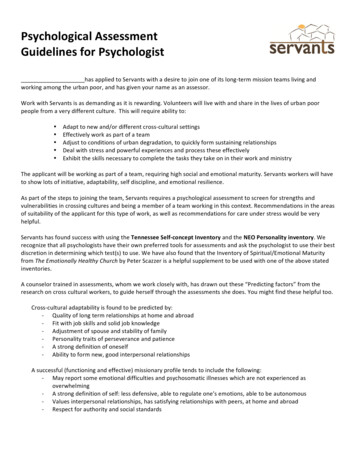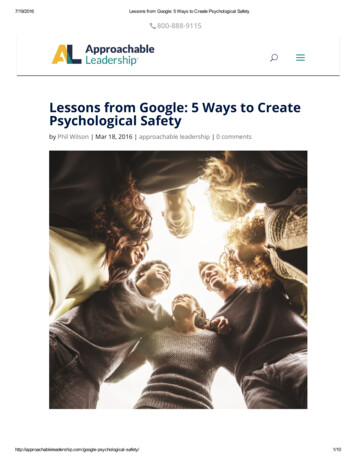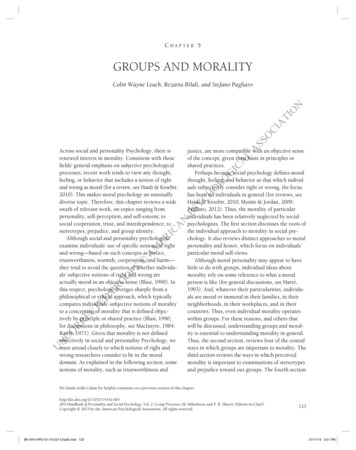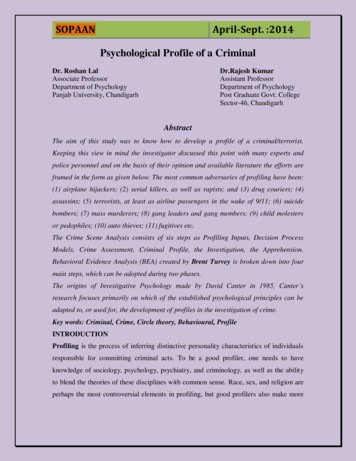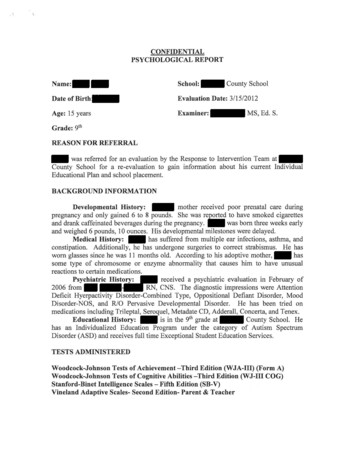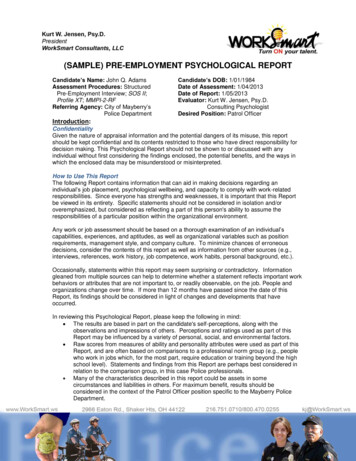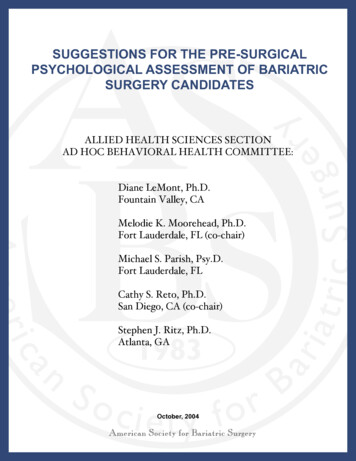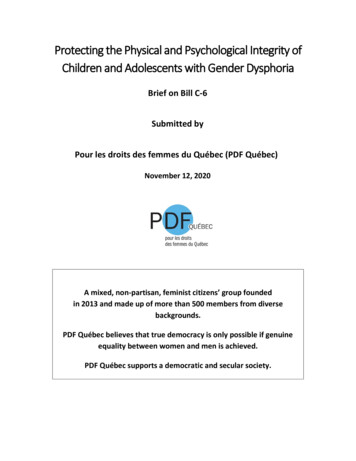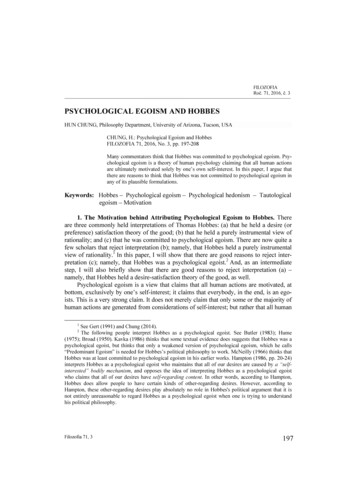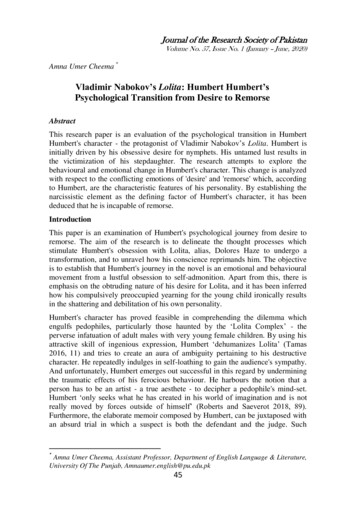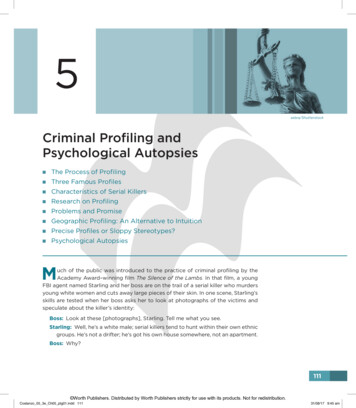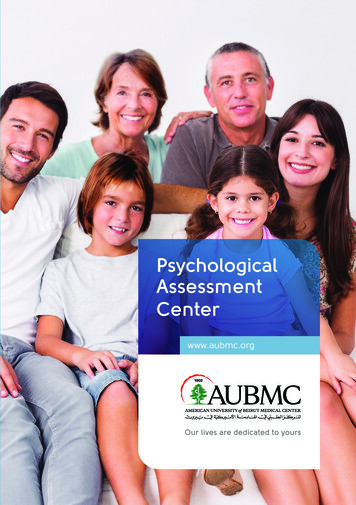
Transcription
PsychologicalAssessmentCenterwww.aubmc.org
1About the PACThe Psychological Assessment Center, housed within the Department of Psychiatry at theAmerican University of Beirut Medical Center (AUBMC), provides services in psychological andneuropsychological assessments spanning clinical, educational, research and social avenues.In 2012, the PAC launched a training affiliation with the Baltimore-based Kennedy KriegerInstitute (KKI) at the Johns Hopkins University School of Medicine. The KKI, and specificallyits neuropsychology department, serve as a model of practice throughout the United Statesin their approach to diagnosing and treating complex neurological and neurodevelopmentaldisorders. Being the first regional center to launch such an affiliation, PAC is steadily expandingits expertise in psychological/neuropsychological assessment and developing its scope ofpractice to serve a wide range of patients and adhere to evidence-based standard of care.The PAC houses the largest library of up-to-date tests in English, Arabic, and French.Instruments are utilized clinically within the PAC, made available to trained researchersthroughout AUBMC, and are also used for clinical training of psychology interns.Mission of PAC
2Core StaffPIA ZEINOUN,MS, LCPC, PHD CANDIDATEMs. Zeinoun is a clinical psychologist specializing in psychologicalassessments for children and young adults presenting with awide range of developmental and neuropsychiatric disorders.Ms. Zeinoun joined the Department of Psychiatry in 2008, soonafter graduating with summa cum laude from Illinois Universitywith a master’s degree in Clinical–Counseling Psychology. In2013, Ms. Zeinoun completed a post-graduate residency inpsychological/neuropsychological assessment at the KKI. Sheis currently pursuing doctoral research at Tilburg University,where she is investigating new methods in test developmentand adaptation, aimed to develop culturally-appropriate tests inArabic. Within the Department of Psychiatry, she has publishedresearch on test development in Arabic, and cross-culturalpsychology. Ms. Pia Zeinoun is a Fulbright alum, an internationalmember of the American Psychological Association (APA),and serves on the executive board of the 2011-2013 LebanesePsychological Association (LPA).MARYSE MAROUN,MSc, PHD CANDIDATEMs. Maroun is a clinical psychologist who specializes inneuropsychology. She received her professional master’sdegree in Clinical Neuropsychology from the Universityof Angers in France, and she holds a bachelor’s degree inCommunication Disorders from Saint-Joseph Universityin Beirut. In 2013, Ms. Maroun completed a post-graduateresidency in neuropsychological assessment at the KKI.Currently, she is conducting doctoral research in psychologyat the University Of Essex in the United Kingdom.Joining the PAC in 2012, Ms. Maroun conducts evaluations forchildren and adults with a wide range of neuropsychologicalpresentations. She holds memberships in the InternationalNeuropsychological Society (INS), the National Academyof Neuropsychology (NAN), the Lebanese PsychologicalAssociation (LPA), and she is the vice-president of theLebanese Speech and Hearing Association (ALO).
3JANETTE ZOUKY, BAJoining the PAC in 2013, Ms. Janette Zouki is a psychologistassistant who provides integral support in test administrationand scoring, and administrative support. She holds a Bachelor’sDegree in Psychology from Notre Dame University, and iscurrently pursuing graduate studies in Psychology. Ms. Janehas field-work experience in working with children with specialneeds, and vulnerable populations. She is an active member ofthe Psychology Society at NDU, and a student-member of theLebanese Psychological Association (LPA).HALA RAAD, MEdMs. Hala Raad joined the Department of Psychiatry at AUBMCin 2012 as a special education teacher. In her role at theChild and Adolescent Psychiatry Program (CAP), she providesintervention services to children with special educationalneeds. In 2013, Mrs. Raad completed a clinical trainingseminar in the administration of the Autism DiagnosticInterview Schedule (ADOS), at the Center for Autism andthe Developing Brain at Weill Cornell Medical College inNew York. Currently, Mrs. Raad administers the ADOS –considered the gold standard for the diagnosis of Autism - fortoddlers and children undergoing evaluations at the PAC.Mrs. Raad is a graduate of the University of Leeds in theUnited Kingdom with a master’s degree in Special EducationalNeeds. She is an alumnus of the Said Foundation scholarshipprogram, and is a founding member and member of theSyndicate of Special Education Teachers in Lebanon.
4Clinical ServicesThrough its clinical services, PAC serves as a critical node to various departments within AUBMC. Neurology Pediatrics Psychiatry Oncology Family Medicine Neuro surgeryWhat is an evaluation?A psychological/neuropsychological evaluation refers to the formal process ofsystematically measuring a sample of cognitive functions and behaviors, in order to answerkey questions about a person’s functioning, and aid in making diagnostic, rehabilitative,educational, and treatment-relevant decisions.This center offers comprehensive psychological and neuropsychological evaluationsfor infants, children, adolescents, adults, and older adults presenting with a spectrum ofpsychological and medical conditions that might be impacting their cognition and behavior.How is the evaluation conducted?The evaluation process involves meeting with the patient and/or family over an extensiveoutpatient visit. The evaluation consists of several steps that include:1. Referral Referral by a clinician. Triage by the Department of Psychiatry.2. Interview Interview with the patient and/or his/her family that centers around current concernsand history.3. Standardized Procedures Administration of standardized tests. Testing typically takes 2 to 6 hours. Tests are usually administered one-on-one with the patient and involve familiaractivities such as puzzles and questions.4. Feedback A post-evaluation feedback session is held with the patient and/ or the patient’s family. A written report of the findings and recommendations are sent to the patient or his/her family and the referring clinician within a month of the evaluation.
5Why are patients referred?Most commonly, patients are referred by their primary physicians, neurologists,psychiatrists, psychotherapists, and rehabilitative therapists in order to: improve diagnostic accuracy. characterize a cognitive profile of strengths and weaknesses. establish a baseline of cognitive functioning. objectively measure cognitive change across time. measure response to surgical, pharmacological, psychological, or other interventions. plan treatments that accommodate functional deficits.The below table identifies how psychological/neuropsychological evaluations areapplied to a variety of patient conditions.ConditionApplication of evaluationNeurodevelopmentaldisorders Patients include children and adults with intellectualdisabilities, learning disabilities, attention deficitand hyperactivity disorder, and autism spectrumdisorders, referred from multiple settings andclinicians such as psychiatrists, pediatricians, andpsychotherapists, and school settings. Evaluations establish diagnosis, identify intellectualstrengths and weaknesses, and aid in devisinghome-based and school-based interventions. The PAC staff is trained in the clinical useof the Autism Diagnostic Observation Schedule(ADOS), the “gold standard” in the diagnosis andtreatment planning of autism spectrum disorders.Neurocognitive disorders:Mild cognitive impairmentand dementias Differentiate between normal ageing, depression,mild cognitive impairment, and variousdementia subtypes. Repeated measures detect change in cognitivefunction across time, and response to medication.Stroke and vasculardisorders Yield a detailed profile of cognitive and functionalabilities to guide interventions and rehabilitation.Traumatic brain injury Predict the functional status of the patient afterthe injury. Guide rehabilitation by clarifying the pattern ofcognitive strengths and weaknesses.
6ConditionApplication of evaluationEpilepsy Predict the cognitive consequences of surgery, andmap the location of cognitive functions in the brain. Measure post-surgical cognitive andfunctional outcomes. Inform medication management by measuringthe cognitive effects of medications.Parkinson’s disease Predict and measure post-surgical cognitiveoutcomes of deep brain stimulation. Define the neuropsychological strengthsand weaknesses of patients.Brain tumors Identify cognitive baseline and cognitive outcomesrelated to tumor resection and immediate andlate-effects of radiation and chemotherapy.Other central nervoussystem disorders Detect cognitive impairment and guide treatmentin other central nervous system disorderssuch as multiple sclerosis, Huntington disease,hydrocephalus, and intracranial aneurysms.Psychiatric disorders Aid in diagnosis and treatment-planningof psychiatric disorders. Evaluate the nature and severity of cognitivedysfunction, especially when a decision has to bemade for the patient’s independent living.Non-central nervoussystem medical conditions An assessment is useful in many non-central nervoussystem conditions, including acute respiratory distresssyndrome, cancer, chronic kidney disease, chronicobstructive pulmonary disease, cardiac disorders,hypertension, obesity, obstructive sleep apnea,and type II diabetes. It detects the presence, nature, and severity ofbrain dysfunction, and helps guide clinicalmanagement and rehabilitation to improve severalaspects of daily functioning.
7Educational and training servicesPart of PAC’s mission is to provide AUBMC and the community with educational andtraining services. The PAC trains internship students in the Clinical Psychology Trainingprogram, conducts lectures and presentation to students and professionals in AUB andthe community at large, and acts as a link for continuing education resources with theKennedy Krieger Institute in Maryland. Additionally, the PAC trains relevant clinical andresearch staff at AUBMC in the use of instruments and tests.ResearchAs psychology, behavioral science, and neuropsychology continue to be emerging fieldsin the Arab region, the psychometric measurement tools that underpin these disciplinescontinue to be imported from developed countries into the Arabic language andpopulation. However, the blind application of psychological tools from one culture andlanguage to another, results in biased measurements which in turn may lead to falseconclusions in research and clinical practice. For these reasons, PAC supports researchefforts that center on the development of culturally applicable and psychometricallysound tools. The core PAC staff is involved in ongoing adaptation and validation ofpsychiatric scales, personality tests, structured interviews, cognitive screeners, andmemory tests.Additionally, as research becomes more trans-disciplinarian, an increasing numberof studies in neuroscience, pediatrics, OBG/YN, public health, nutrition, and familymedicine, are incorporating psychological outcome measures in their procedures. Inresponse, PAC offers its library of tests, resources, and expertise, to support the use ofstandardized and culturally appropriate psychological tools in research.
8Largest libraries of up-to-datetests in the region Wechsler Intelligence Scale for Children (WISC-IV), Wechsler Adult Intelligence Scale(WAIS IV), Wechsler Preschool and Primary Scale of Intelligence (WPPSI IV), Test ofNonverbal Intelligence (TONI 3), Kaufman Assessment Battery for Children (K-ABC),Woodcock Johns Tests of Cognitive Abilities and Achievement III (WJ III), DifferentialAbilities Test (DAS), (and others). Repeatable Battery for the Assessment of Neuropsychological Status (R-BANS), NEPSY II, NAB. Test of Variables of Attention (TOVA), Test of Evaluation of Attention (TEA & TEA-CH). Delis-Kaplan Executive Function System (D-KEFS), Wisconsin Card Sorting Test(WCTS), Behavioral Assessment for Dysexecutive Syndrome (BADS/C). Wide Range Assessment of Memory and Learning (WRAML 2), Wechsler MemoryScales (WMS IV), California Verbal Learning Test (CVLT/C). Receptive /Expressive One-Word Picture Vocabulary Tests (EOWPVT IV), Token, BostonDiagnostic Aphasia Examination (BDAE–3). Beery VMI, Rey Complex Figure and Recognition, Symbol Digit Modality (SDM). Grooved Pegboard, Dean Woodcock Sensorymotor Batter (D-WSB). Vineland II, ADL, Adaptive Behavior Assessment System (ABAS II). Minnesota Multiphasic Personality Inventory (MMPI-2), Children’s Apperception Test (CAT). Autism Diagnostic Observation Schedule (ADOS 1,2,3,4), Autism Diagnostic Interview (ADI-R).
American University of BeirutMedical CenterP.O. Box 11-236 Riad El SolhBeirut 1107 2020LebanonTel: 961-1-350 000Fax: 961-1-744 467www.aubmc.org
Institute (KKI) at the Johns Hopkins University School of Medicine. The KKI, and specifically . As psychology, behavioral science, and neuropsychology continue to be emerging fields in the Arab region, the psychometric measurement tools that underpin these disciplines
